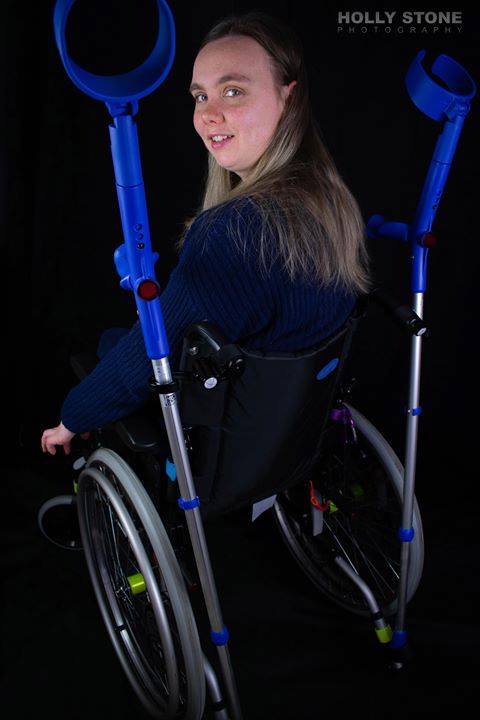Story
I have just returned to work following my 2nd long term sickness from with a whole list of chronic health conditions. Despite being on a pharmacy of medications, we still don't have the balance right to allow me to live a ‘normal’ life.

My main aim was just to get my symptoms under control and back to work which I have done, to an extent! But I now use a wheelchair to be able to be more active and involved.
It helps to reduce the fatigue and joint pain I am suffering. Although it is great I am still finding it difficult on my bad days and hills (or even gentle slopes) are a no go.

I know the wheels are expensive but I feel like they would help me so much. I want to go out and get my life back. I want to be more sociable after work and not just go straight to bed. But to do that I need more energy. I've done a lot of research and these are the lightest and the best and have excellent reviews.
These Albert E-Motion M25 power assist wheels are brilliant for people like me. They are life changing in enabling me to independently get out and about while still maintaining the benefits of a manual chair. Highly recommended this product. - Quad 08/03/2019
Details: With its highly efficient and silent electric motors, the innovative Alber E-Motion M25 will fit almost any modern wheelchair meaning that you can continue to use your custom-made chair whilst benefiting from this fantastic E-Motion technology which allows you to move, steer and brake your wheelchair with very little effort. Providing an impressive active range and unwavering durability, energy is supplied through fully chargeable, ultra-high-power lithium-ion batteries. Each wheel weighs just 7.8kg (17lbs) including the standard battery pack making it the lightest available active add-on. The wheels can be easily attached and removed from the wheelchair. The ECS remote control unit allows you to switch the E-Motion on and off easily from your seat and it can also activate the patented roll-back delay feature which holds you on the spot for five seconds and enables you to reposition your grip without the wheelchair rolling backwards. The Alber E-Motion M25 is perfect for busy, active individuals who are on the lookout for a powerful and versatile mobility solution and its advanced driving sensors are suited to less physically active users as well as stronger ones. You can also take advantage of the free Smartphone app with cruise control which can keep your speed constant even when going up steep inclines. It can also track the battery charge level and mileage as well as indicating faults and suggesting solutions. <https://www.completecareshop.co.uk/wheelchairs/power-add-ons-for-wheelchairs/alber-e-motion-m25>
- - - - - - - - - - - - - - -
Behcet's Disease (Apr 2008)
- a rare and poorly understood condition that results in inflammation of the blood vessels and tissues. Most people with the condition experience episodes where their symptoms are severe (flare-ups or relapses), followed by periods where the symptoms disappear (remission). Symptoms include: Ulcers, Headaches, Painful/Stiff Joints, Sensitive Skin, Abdominal Pain, Loss of Balance.
Chronic Fatigue Syndrome (Apr 2008)
- long-term illness with a wide range of symptoms. Most people with CFS get better over time, although some people don't make a full recovery. It's also likely there will be periods when your symptoms get better or worse. Symptoms include: Extreme Tiredness, Muscle/Joint Pain, Heart Palpitations, Headaches, Problems Thinking/Remembering/Concentrating, Dizziness.
Fibromyalgia (Sept 2019)
- a long-term condition that causes pain all over the body. As well as widespread pain, people with fibromyalgia may also have; increased sensitivity to pain , extreme tiredness (fatigue) , muscle stiffness , difficulty sleeping , problems with mental processes (known as "fibro-fog"), such as problems with memory and concentration , headaches , irritable bowel syndrome (IBS), a digestive condition that causes stomach pain and bloating.
Short Term Memory Issues (May 2008)
Hyper-mobility (Oct 2012)
- a rare inherited condition that affect connective tissue. EDS can affect people in different ways. For some, the condition is relatively mild, while for others their symptoms can be disabling. Symptoms include: Joint Hypermobility , Loose/Unstable Joints that Dislocate Easily , Painful/Clicking Joints , Fatigue, Skin that Bruises Easily.
Hip Dysplasia (Sept 2017)
- a condition where the "ball and socket" joint of the hip does not properly form. The hip joint attaches the thigh bone (femur) to the pelvis. The top of the femur (femoral head) is rounded, like a ball, and sits inside the cup-shaped hip socket. The socket of the hip is too shallow and the femoral head is not held tightly in place, so the hip joint is loose. In severe cases, the femur can come out of the socket (dislocate).
Small Intestine Bacterial Overgrowth (Sept 2019)
- a medical condition in which a person has an unusually large population of bacteria in their small intestine. SIBO is a complication of other digestive conditions, such as IBS, Crohn's disease, and celiac disease [Still investigating cause]
Raynaud's Disease (May 2018)
- a condition that affects the blood vessels in the body's extremities. Symptoms include: Pain , Numbness , Pins and Needles , Difficulty Moving the Affected Area.
Hyperhidrosis (May 2018)
Chronic Migraine (Jan 2019)
- a distinct and relatively recently defined sub-type of Chronic Daily Headache. The International Headache Society defines chronic migraine as more than fifteen headache days per month over a three month period of which more than eight are migrainous. Due to the nature and length of time that the sufferer is affected, people with chronic migraine experience significantly more time absent from work, school, leisure, housework and social activities than episodic migraine patients. Efficiency is also reduced due to chronic migraine, resulting in a more than 50% reduction in productivity from work or school. The impact of chronic migraine can be very disabling. Being incapacitated for over half the month sometimes means that people are unable to work at all, with some claiming disability living allowance. Unfortunately, in many cases, current therapies are not enough to prevent or reduce the impact that chronic migraine has on people’s lives. The World Health Organisation (WHO) has recognised the impact of migraine worldwide and categorised it as the same level of disability as dementia, quadriplegia and acute psychosis. Furthermore WHO classified chronic migraine as more disabling than blindness, paraplegia angina or rheumatoid arthritis.
- - - - - - - - - - - - - - -
